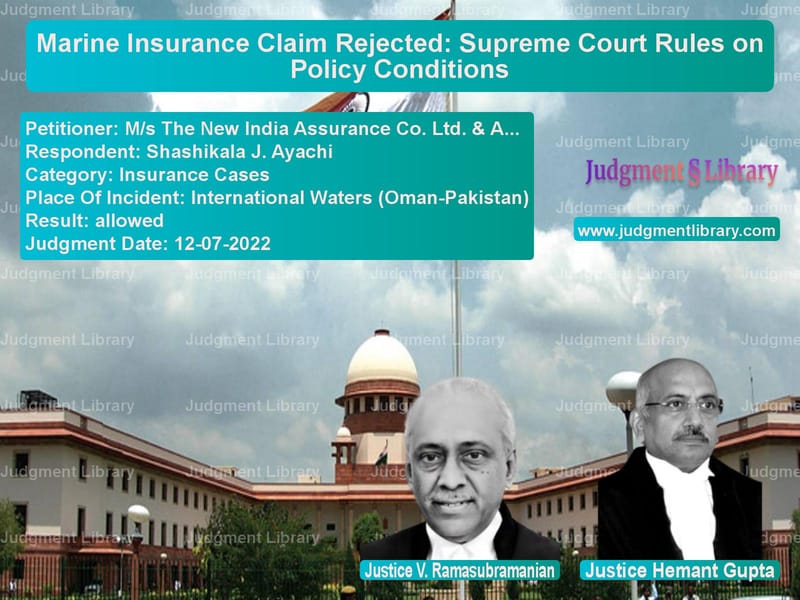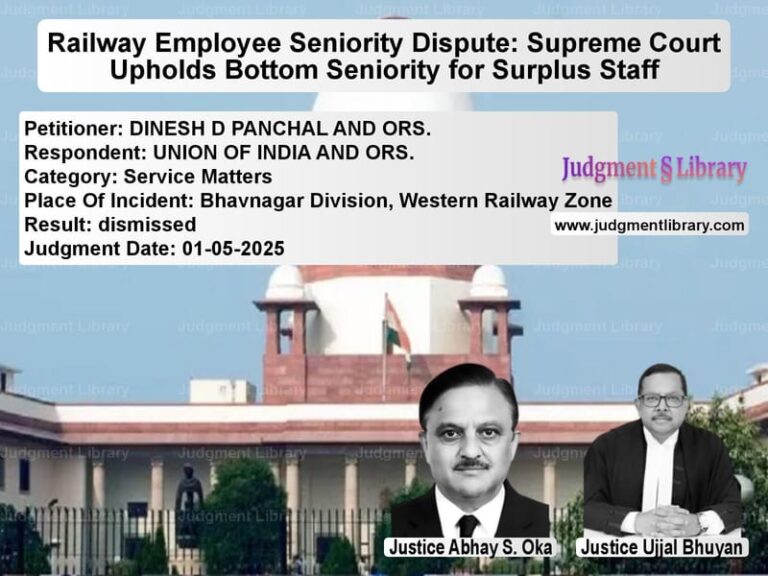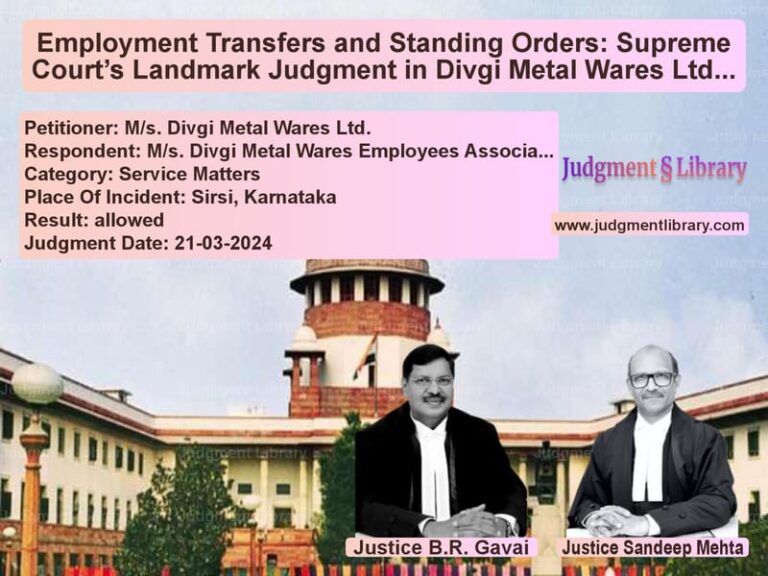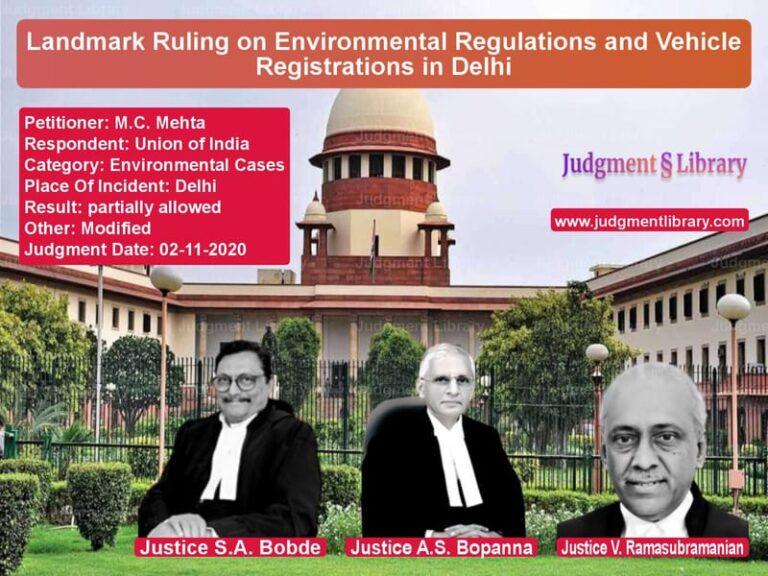Marine Insurance Claim Rejected: Supreme Court Rules on Policy Conditions
The Supreme Court of India recently ruled in M/s The New India Assurance Co. Ltd. & Anr. vs. Shashikala J. Ayachi, clarifying legal principles concerning marine insurance claims and the strict interpretation of policy conditions. The case involved a dispute over the sinking of a vessel and the insurance company’s decision to reject the claim based on non-compliance with policy terms.
Background of the Case
The respondent, Shashikala J. Ayachi, had insured her vessel, MSV Sea Queen, under a marine insurance policy issued by New India Assurance Company Ltd. for Rs.1,62,70,000. The policy covered the period from October 4, 2010, to October 3, 2011.
On May 30, 2011, the vessel allegedly sank in international waters between Oman and Pakistan due to bad weather. The insured filed a claim with the insurer, which was neither accepted nor rejected for over two years. Eventually, on September 4, 2013, the insurer repudiated the claim, citing that:
- The vessel was engaged in illegal activities.
- The vessel had not sunk due to bad weather.
- Meteorological reports showed fair weather conditions on the date of the incident.
- The crew had conflicting statements, leading to doubts about the sinking claim.
Petitioner’s Arguments (New India Assurance)
The insurance company defended its decision, arguing:
- The vessel was in prohibited waters, violating policy conditions.
- Satellite-based weather reports for the Persian Gulf contradicted claims of rough tides.
- Surveillance data suggested possible hijacking by Somali pirates.
- The crew’s statements to customs authorities were self-serving and unverified.
- There was an inordinate delay in reporting the incident, raising suspicion.
- Under Clause 12 of the Policy Document, the insurer was entitled to deny claims for missing vessels unless conclusive proof of loss was provided.
Respondent’s Arguments (Shashikala J. Ayachi)
The insured countered:
- The incident was reported immediately, but the insurance company delayed action.
- The insurance surveyor took over two years to submit a report.
- Independent evidence, including crew statements, confirmed that the vessel sank due to bad weather.
- The insurer was using technicalities to deny a legitimate claim.
- Under the Marine Insurance Act, 1963, insurers must provide an immediate response to claims.
- Clause 12 did not apply, as there was clear evidence of sinking.
Supreme Court’s Observations
The Supreme Court analyzed multiple factors before reaching its decision:
- The insurer’s delay in claim processing violated IRDA guidelines.
- Statements of the vessel crew were crucial but needed corroboration.
- The insurer’s reliance on meteorological reports was valid but not conclusive proof of fraud.
- The policy exclusion clauses must be interpreted strictly against the insurer.
- The insurer should have conducted an independent third-party forensic analysis instead of solely relying on weather reports.
Key Legal Precedents Considered
The Supreme Court relied on several rulings, including:
- United India Insurance Co. Ltd. v. Pushpalaya Printers (2004): Held that insurance terms must be strictly construed.
- New India Assurance Co. Ltd. v. Harsolia Motors (2020): Ruled that delays in claim settlement can be considered deficiency of service.
- Bharat Insurance Co. Ltd. v. Lakshmi Narain (2009): Emphasized that burden of proof of exclusion rests on the insurer.
- General Assurance Society Ltd. v. Chandmull Jain (1966): Held that ambiguities in insurance contracts must be interpreted in favor of the insured.
Final Judgment
The Supreme Court ruled in favor of the insurance company, overturning the National Consumer Disputes Redressal Commission (NCDRC) decision. Key findings included:
- The vessel was plying in restricted waters, violating policy conditions.
- There was no conclusive evidence of bad weather leading to the vessel’s sinking.
- The insurance company’s delay in claim processing was improper but did not override the policy exclusions.
- The burden of proving a valid loss rested on the insured, who failed to provide conclusive evidence.
Implications of the Ruling
The judgment reinforces key principles in marine insurance law:
- Strict compliance with policy conditions is essential.
- Burden of proof lies on the insured to establish a valid claim.
- Insurance companies must expedite claim decisions but cannot be forced to pay non-compliant claims.
- Ambiguities in policy terms should be resolved through independent investigation rather than blanket denial.
This ruling sets a precedent for future disputes involving marine insurance claims and policy exclusions.
Petitioner Name: M/s The New India Assurance Co. Ltd. & Anr..Respondent Name: Shashikala J. Ayachi.Judgment By: Justice V. Ramasubramanian, Justice Hemant Gupta.Place Of Incident: International Waters (Oman-Pakistan).Judgment Date: 12-07-2022.
Don’t miss out on the full details! Download the complete judgment in PDF format below and gain valuable insights instantly!
Download Judgment: ms-the-new-india-as-vs-shashikala-j.-ayachi-supreme-court-of-india-judgment-dated-12-07-2022.pdf
Directly Download Judgment: Directly download this Judgment
See all petitions in Marine and Cargo Insurance Disputes
See all petitions in Insurance Settlements
See all petitions in Commercial Insurance Disputes
See all petitions in Judgment by V. Ramasubramanian
See all petitions in Judgment by Hemant Gupta
See all petitions in allowed
See all petitions in supreme court of India judgments July 2022
See all petitions in 2022 judgments
See all posts in Insurance Cases Category
See all allowed petitions in Insurance Cases Category
See all Dismissed petitions in Insurance Cases Category
See all partially allowed petitions in Insurance Cases Category







